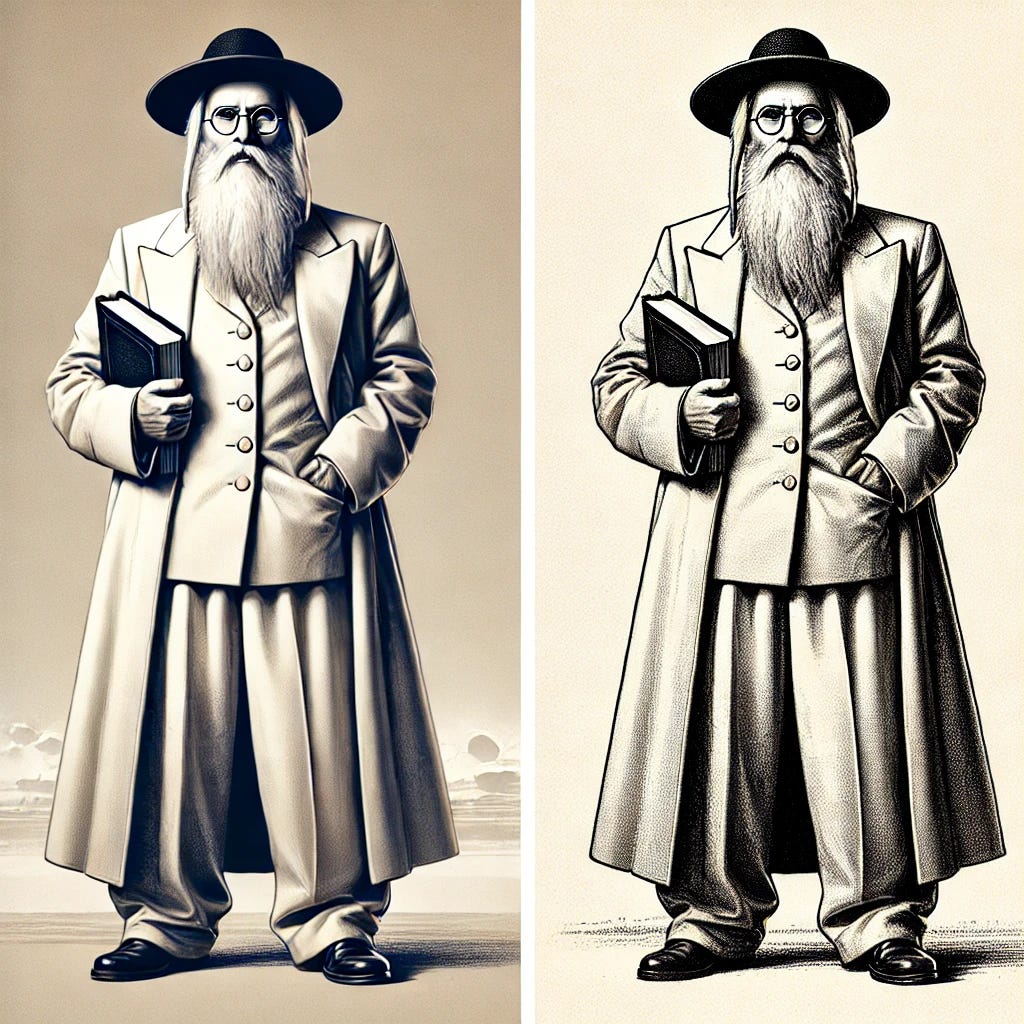Rabba bar Rav Huna the Little / Short
On Bava Batra 66, we encounter Rabba bar Rav Huna Zuta.
שְׁלַח לֵיהּ רַב נְחֶמְיָה בְּרֵיהּ דְּרַב יוֹסֵף לְרַבָּה בְּרֵיהּ דְּרַב הוּנָא זוּטֵי, לִנְהַרְדְּעָא: כִּי אָתְיָא הָךְ אִיתְּתָא לְקַמָּךְ,
§ Rav Neḥemya, son of Rav Yosef, sent a message to Rabba son of Rav Huna the Short at Neharde’a: When this woman bearing this letter comes before you,
What is this business with zuta? Perhaps he is wearing a zoot suit?
Seder HaDorot discusses whether Rav Huna Zuta is the same as plain Rav Huna. (After all, Rav Huna did have a son Rabba.) He writes:
רב הונא זוטא בזמן רב יוסף ובזמן רב הונא הגדול ולזה קראו זוטא או הוא ר"ה סתם שהיה גוצא (ע"ש) ולא מצאתי ר"ה זוטא כ"א כשמזכיר רבה בנו אמר רבה בר הונא זוטא (ע"ש) ואולי צ"ל רב המנונא זוטא (ע"ש):
He thus knows that Rav Huna Zuta is about (third-generation) Rav Yosef and (second-generation) famous Rav Huna. The reason for calling him Zuta is to distinguish him from plain Rav Huna.
I think I’d differ slightly and say that it is to distinguish this Rabba bar Rav Huna from the other famous Rabba bar the famous Rav Huna. He is thus the lesser one of these. I don’t think Rav Huna Zuta appears by himself, so the Zuta could well apply to the first part of it.
Seder HaDorot continues that perhaps it is the same Rav Huna. After all, Zuta means little or short, and we know that Rav Huna was short.
That is, Rav blessed Rav Huna that he should be covered in silks (thus rich). At Rav Huna’s son Rabba’s wedding, he slept on a bed. He was short, and his daughters and daughters-in-law did not notice him, and threw their silk garments on him on the bed, fulfilling the blessing. He told Rav, who was annoyed that Rav Huna didn’t reciprocate the blessing at the time. See Megillah 27b.
כִּי אִיכַּלַּל רַבָּה בְּרֵיהּ, רַב הוּנָא אִינִישׁ גּוּצָא הֲוָה, גְּנָא אַפּוּרְיָא. אָתְיָין בְּנָתֵיהּ וְכַלָּתֵיהּ שָׁלְחָן וְשָׁדְיָין מָנַיְיהוּ עֲלֵיהּ עַד דְּאִיטּוּם בְּשִׁירָאֵי. שְׁמַע רַב וְאִיקְּפַד, אֲמַר: מַאי טַעְמָא לָא אֲמַרְתְּ לִי כִּי בָּרֵכְתָּיךְ: ״וְכֵן לְמָר״.
When Rabba, his son, was married, Rav Huna, who was a short man, was lying on his bed, and owing to his diminutive size he went unnoticed. His daughters and daughters-in-law came into the room and removed and threw their silk garments upon him until he was entirely enveloped in silk. With this, Rav’s blessing was fulfilled to the letter. When Rav heard about this, he became angry with Rav Huna, and said: What is the reason that when I blessed you, you did not respond in kind and say to me: And likewise to the Master? Had you done so, I would have also benefitted from the blessing.
This seems rather unlikely. Why mention the shortness / gitza in only specific places, where it is Rabba bar Rav Huna Zuta? It clearly is a means of disambiguating. Also, consider where the missive was sent — to Nehardea, while the real Rav Huna and his son Rabba bar Rav Huna presided over Sura.
In terms of placing Rabba bar Rav Huna Zuta, we should look to Toledot Tannaim vaAmoraim:
הוא היה הדיין שם ככתובות סט. ששלח לו רב נחמיה בריה דרב יוסף כי אתיא ההיא איתתא לקמך אגבה עישור ניכסי, וידוע שרב נחמיה היה תלמיד רבא א"כ היה רבה בר"ה זוטא הריש בנהרדעא בזמן ר"פ.
וכן ביצה כט: דרש רבא [צ"ל רבה כבדפוס שונציני ובשאלתות פ' אמור] בר"ה זוטי אפתחא דנהרדעא, א"ל רב נחמן פוקו וא"ל לאבא (חברי, רש"י) שקילא טיבותך וכו', (ותיבת ר"נ הוא ט"ס וצ"ל כגרסת דק"ס רב חמא והיא גרסא אמיתית כי רב חמא היה ג"כ הריש בנהרדעא אחר רנב"י כדמובא באגרת דרש"ג ח"ג פ"ב).
That is, these people are later than suggested above. Rav Nechemiah bar Rav Yosef was fifth-generation, Rava’s student, and so was Rabba bar Rav Huna Zuta, the head of Nehardea (not Sura, where plain third-generation Rabba bar Rav Huna presided), in the time of fifth-generation Rav Pappa.


